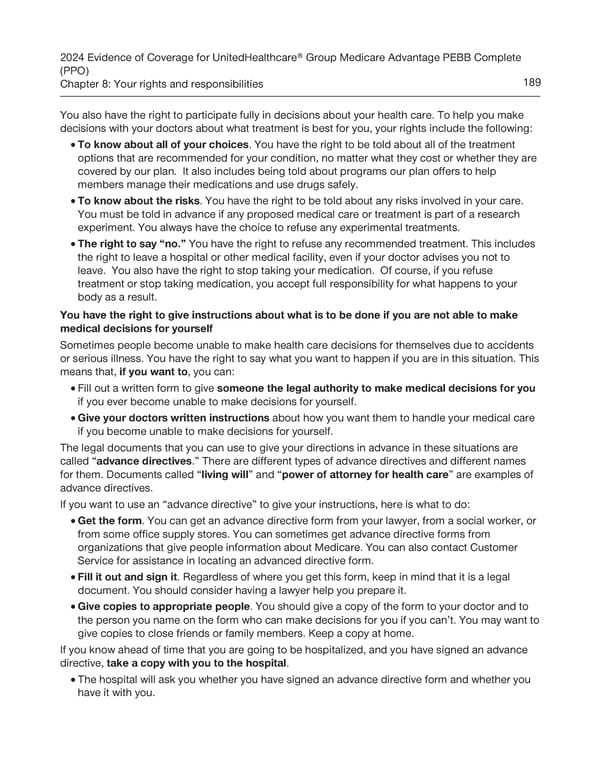2024 Evidence of Coverage for UnitedHealthcare® Group Medicare Advantage PEBB Complete (PPO) Chapter 8: Your rights and responsibilities 189 You also have the right to participate fully in decisions about your health care. To help you make decisions with your doctors about what treatment is best for you, your rights include the following: · To know about all of your choices. You have the right to be told about all of the treatment options that are recommended for your condition, no matter what they cost or whether they are covered by our plan. It also includes being told about programs our plan offers to help members manage their medications and use drugs safely. · To know about the risks. You have the right to be told about any risks involved in your care. You must be told in advance if any proposed medical care or treatment is part of a research experiment. You always have the choice to refuse any experimental treatments. · The right to say “no.” You have the right to refuse any recommended treatment. This includes the right to leave a hospital or other medical facility, even if your doctor advises you not to leave. You also have the right to stop taking your medication. Of course, if you refuse treatment or stop taking medication, you accept full responsibility for what happens to your body as a result. You have the right to give instructions about what is to be done if you are not able to make medical decisions for yourself Sometimes people become unable to make health care decisions for themselves due to accidents or serious illness. You have the right to say what you want to happen if you are in this situation. This means that, if you want to, you can: · Fill out a written form to give someone the legal authority to make medical decisions for you if you ever become unable to make decisions for yourself. · Give your doctors written instructions about how you want them to handle your medical care if you become unable to make decisions for yourself. The legal documents that you can use to give your directions in advance in these situations are called “advance directives.” There are different types of advance directives and different names for them. Documents called “living will” and “power of attorney for health care” are examples of advance directives. If you want to use an “advance directive” to give your instructions, here is what to do: · Get the form. You can get an advance directive form from your lawyer, from a social worker, or from some office supply stores. You can sometimes get advance directive forms from organizations that give people information about Medicare. You can also contact Customer Service for assistance in locating an advanced directive form. · Fill it out and sign it. Regardless of where you get this form, keep in mind that it is a legal document. You should consider having a lawyer help you prepare it. · Give copies to appropriate people. You should give a copy of the form to your doctor and to the person you name on the form who can make decisions for you if you can’t. You may want to give copies to close friends or family members. Keep a copy at home. If you know ahead of time that you are going to be hospitalized, and you have signed an advance directive, take a copy with you to the hospital. · The hospital will ask you whether you have signed an advance directive form and whether you have it with you.
 UnitedHealthcare PEBB Complete EOC (2024) Page 194 Page 196
UnitedHealthcare PEBB Complete EOC (2024) Page 194 Page 196